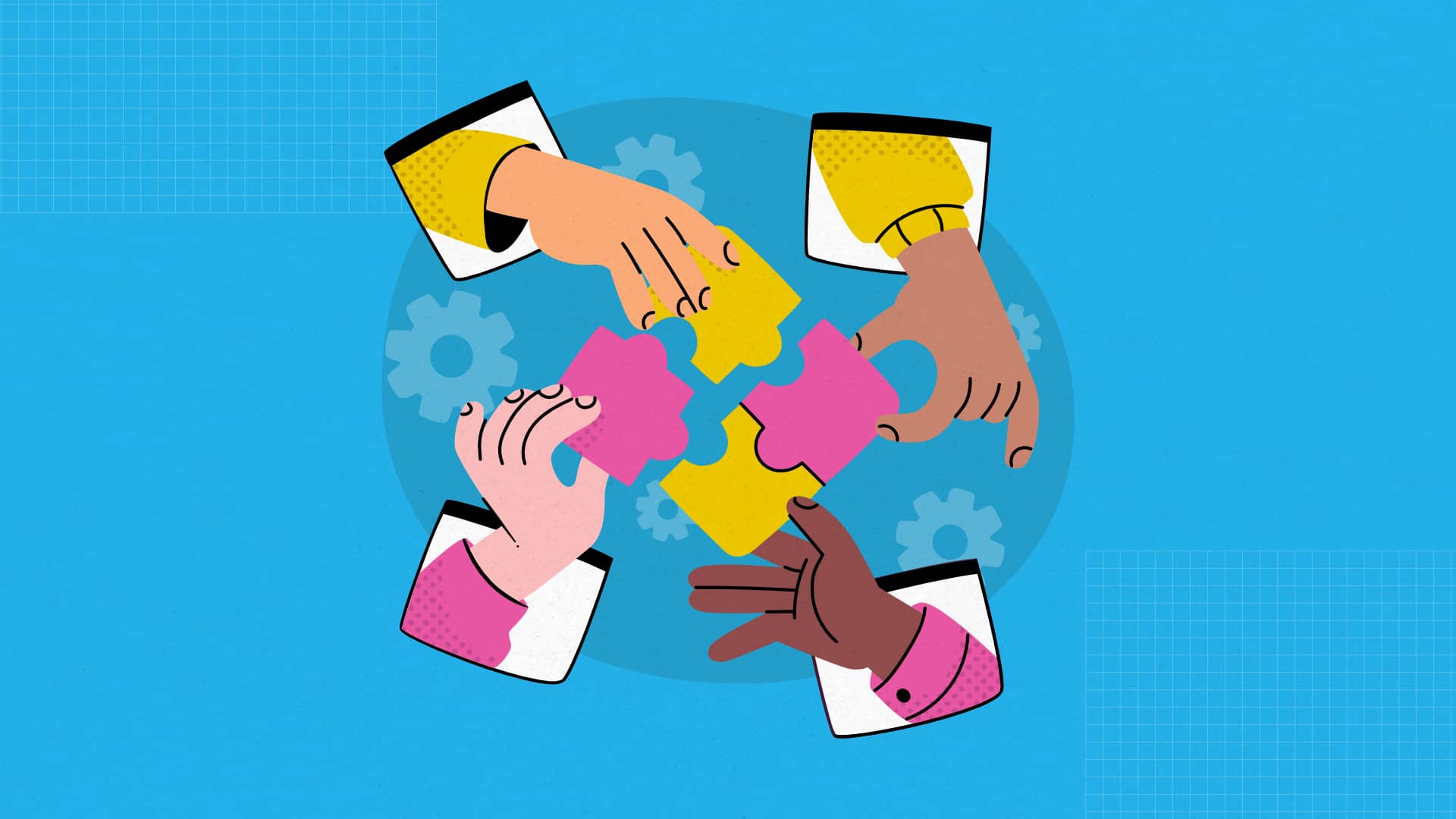Managing multiple projects at once is no small task. Tight deadlines, scattered communication, overlapping responsibilities – without a clear structure, things can quickly spiral out of control. In fact, only 55% of projects are completed on time, and poor coordination is a major reason for delays.
As a manager, your job is not only about assigning tasks. You need to make sure that everything (and everyone) moves in sync. That’s where project coordination comes in. It’s the foundation of efficient execution of projects, helping you align teams, streamline workflows, and hit goals without last-minute chaos.
I’ve been there – leading marketing campaigns, overseeing product launches, and managing cross-functional teams at ProofHub. The projects that ran seamlessly weren’t necessarily the ones with the most resources or time; they were the ones with an effective coordination strategy. Because no matter how skilled your team is, miscommunications, unclear responsibilities, and scope creep can derail even the best-laid plans.
In this article, you will learn everything about project coordination – what it is, why it is important, and its key stages that keep projects on track, from planning and execution to monitoring and completion.
Plus, you’ll discover best practices that will help you eliminate confusion, enhance collaboration, and ensure the successful completion of projects
Let’s get started!
What is project coordination?
Project coordination is the process of organizing tasks, people, and resources to make sure that a project runs smoothly and meets its goals. It’s about keeping everything on track – making sure teams know what to do, deadlines are met, and issues are addressed before they cause delays.
It works as the glue that holds a project together. Without proper coordination, even the best plans can fall apart due to missed deadlines, miscommunication, or overlapping tasks. A good project coordinator ensures that everyone is aligned, tasks are distributed effectively, and teams stay productive.
What is the difference between project coordination and project management?
While project coordination and project management may sound similar, they serve different purposes in ensuring the success of a project. These two key roles work together – one focuses on the overall process, while the other makes sure that daily tasks are completed effectively.
A project manager is responsible for planning, decision-making, and overall project execution. They set goals, allocate budgets, manage risks, and ensure the project aligns with business objectives.
On the other hand, a project coordinator supports the project manager by handling administrative tasks, tracking progress, organizing meetings, and ensuring teams stay aligned.
Here’s a quick comparison of the roles:
| Aspect | Project manager | Project coordinator |
| Main focus | Strategy, planning, and execution | Day-to-day task coordination |
| Responsibilities | Budgeting, risk management, stakeholder communication, decision-making | Scheduling, tracking tasks, encouraging communication |
| Decision-making | High-level, business-driven decisions | Supports decisions but doesn’t make them |
| Who they work with | Executives, stakeholders, teams | Team members, project manager |
| Key goal | Delivering the project successfully | Keeping project tasks organized and teams aligned |
Let’s understand with an example – imagine your company is developing a new mobile app.
The role of the project manager will be to decide the scope, budget, and timeline, making sure that the app meets business goals. They plan the overall strategy and make critical decisions.
The project coordinator will make sure that developers, designers, and marketers are on track, schedules meetings, updates progress reports, and helps resolve minor issues.
A well-defined structure – with a skilled project manager and a proactive project coordinator, helps businesses avoid delays and inefficiencies.
Also read – How to become a project manager: Top-notch tips and skills
Why is project coordination important?
Project coordination is the foundation of any successful project. When teams know their roles, deadlines are clear, and communication flows smoothly, projects stay on track. But without effective coordination, even the most skilled teams can struggle with delays, miscommunication, and missed goals.
In fact, 67% of projects fail due to inadequate coordination and planning. That means more than half of the projects don’t meet their objectives simply because tasks weren’t aligned properly. On the flip side, 89% of high-performing organizations prioritize project management, resulting in more efficiency and successful outcomes.
Here are some key benefits of effective project coordination:
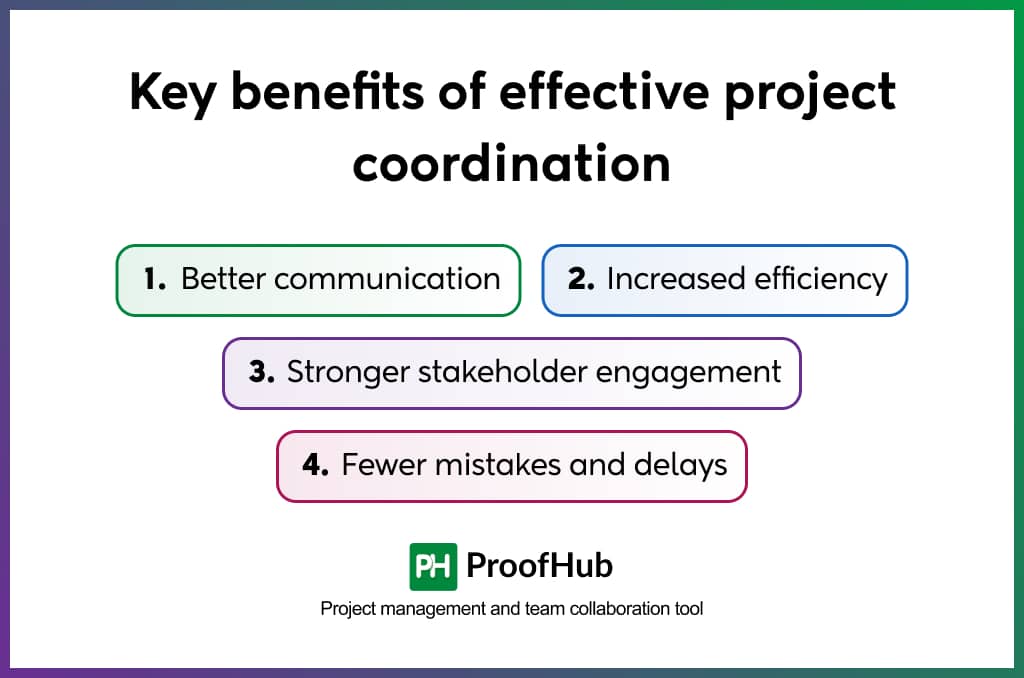
- Better communication: When everyone is on the same page, there’s less confusion. Teams know who is responsible for what, reducing unnecessary back-and-forths.
- Increased efficiency: Proper coordination makes sure that tasks are completed in the right order, reducing bottlenecks and wasted effort.
Also read – What is a bottleneck in project management? Everything you need to know
- Stronger stakeholder engagement: Keeping stakeholders updated with progress reports and clear timelines builds trust and ensures everyone is aligned on expectations.
- Fewer mistakes and delays: By tracking tasks and resolving issues quickly, project coordination minimizes errors and keeps everything on track.
What are the stages of project coordination?
Successful project coordination is never about only assigning tasks. It’s a step-by-step process that ensures everything and everyone stays on the same page. Each stage is essential for keeping teams aligned, resources optimized, and goals on track.
The six stages of project coordination are:
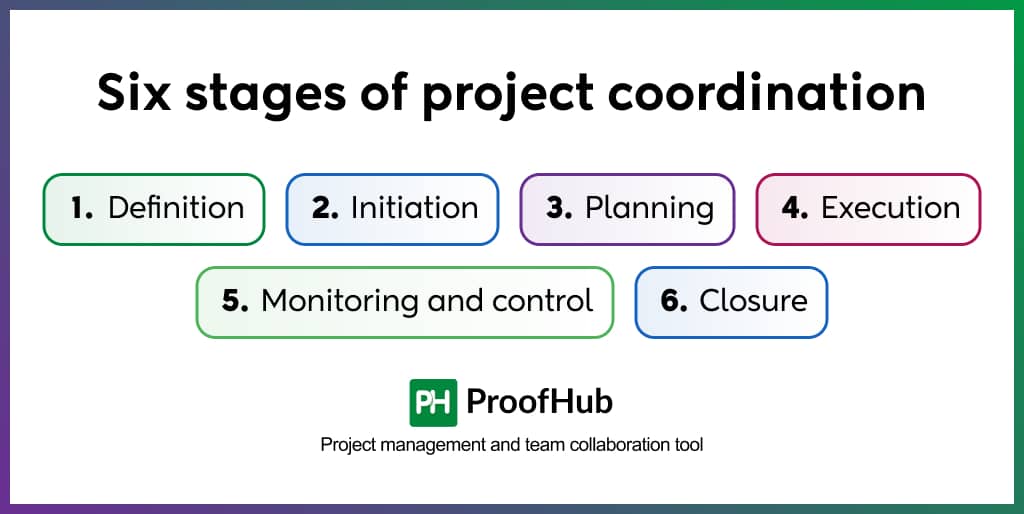
- Definition
Every project starts with a clear objective. What are we trying to achieve? Who are the key stakeholders? What are the expected outcomes? A well-defined scope prevents confusion later on.
For instance, a company planning a new website must decide: Is it an informational site? An e-commerce store? A customer support portal?
Without clear goals, teams can understand the project in different perspectives and work in different directions, wasting time and resources.
- Initiation
Once the project is defined, it’s time to bring in the right people. This includes assigning a project manager, coordinators, and team members. Clear roles prevent overlap, keep everyone efficient and accountable.
- Planning
A detailed plan includes timelines, budgets, task assignments, and risk assessments. This stage helps you avoid last-minute surprises.
For example, if a company is launching a new app, planning ensures that designers, developers, and marketers all work on aligned timelines, preventing any delays.
- Execution
This is where the real work happens. Teams work on tasks, and the coordinator ensures smooth communication among members, tracks progress, and resolves small issues before they escalate.
You can use project management tools like ProofHub to keep everyone on the team organized and aligned with project goals.
- Monitoring and control
Challenges are inevitable, but strong coordination helps team members adjust. So, regularly check progress against goals, track performance, take quick action on issues, and tweak your processes if needed to keep things on schedule.
For instance, if there is a delay in product launch, project coordination helps find alternatives before it disrupts the entire timeline.
- Closure
Once the project is completed, it’s important to evaluate what worked and what didn’t. A final review helps teams improve processes for future projects.
Without a standardized process for project closure, valuable lessons are lost, resulting in repeated mistakes in future projects.
The roles and responsibilities of a project coordinator
A project coordinator keeps a project moving forward. While the project manager sets the vision and makes strategic decisions, the coordinator ensures that day-to-day operations run smoothly. Their job is to keep everyone aligned, track progress, and handle the details that can make a project successful or a failure.
Here are some key responsibilities of a project coordinator:
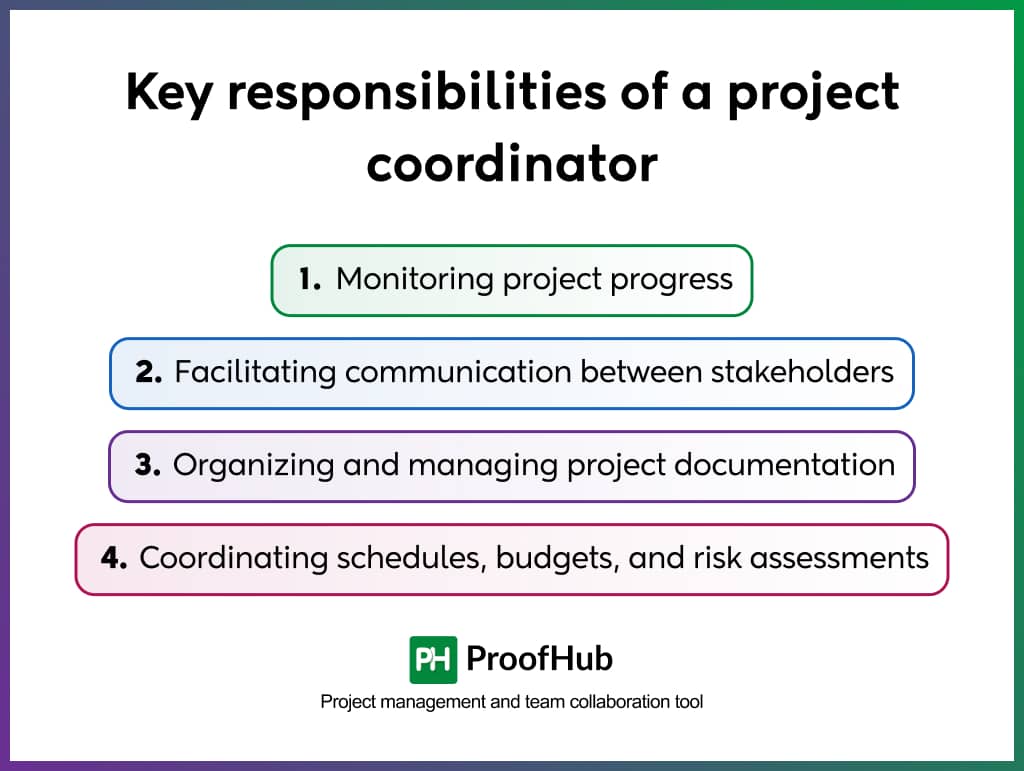
1. Monitoring project progress
A project coordinator keeps a close eye on deadlines, making sure no task is missed. They track milestones, follow up with team members, and adjust schedules when needed.
Example: If a software development project falls behind because the testing team hasn’t received the latest code update, the project coordinator steps in, finds out the cause, and ensures it gets resolved.
2. Facilitating communication between stakeholders
Clear communication is the foundation of any successful project. From clients to team members, everyone needs updates. The coordinator ensures smooth communication – whether through meetings, emails, or reports – so no one is left in the dark.
Example: If a marketing team is launching a new campaign and needs input from the design team, the coordinator schedules meetings, shares timelines, and ensures both teams are aligned, preventing last-minute chaos.
3. Organizing and managing project documentation
From meeting notes to progress reports, project documentation keeps everything structured. A coordinator keeps everything organized and ensures that all files are updated, accessible, and properly stored for easy reference.
Example: In a construction project, tracking permits, blueprints, and contracts is crucial. The coordinator maintains these records, ensuring compliance and avoiding costly delays.
4. Coordinating schedules, budgets, and risk assessments
A project can quickly spiral out of control if schedules aren’t realistic or budgets are mismanaged. Coordinators help teams stay within limits and anticipate risks before they become major issues.
Example: In an event planning project, the coordinator tracks venue bookings, vendor payments, and potential risks (like weather delays), making sure that everything is planned for success.
A skilled project coordinator helps complete projects on time by keeping teams organized, eliminating bottlenecks, and ensuring efficient execution.
Project coordinators turn chaos into structure, making sure that projects move forward without unnecessary work stress or setbacks.
Essential skills for effective project coordination
Project coordination requires a mix of technical know-how and soft skills to keep projects moving smoothly. A great project coordinator makes sure that teams stay aligned, deadlines are met, and unexpected challenges are handled efficiently.
But what makes a project coordinator truly effective?
Here are the essential skills needed for successful project coordination and how you can develop them.
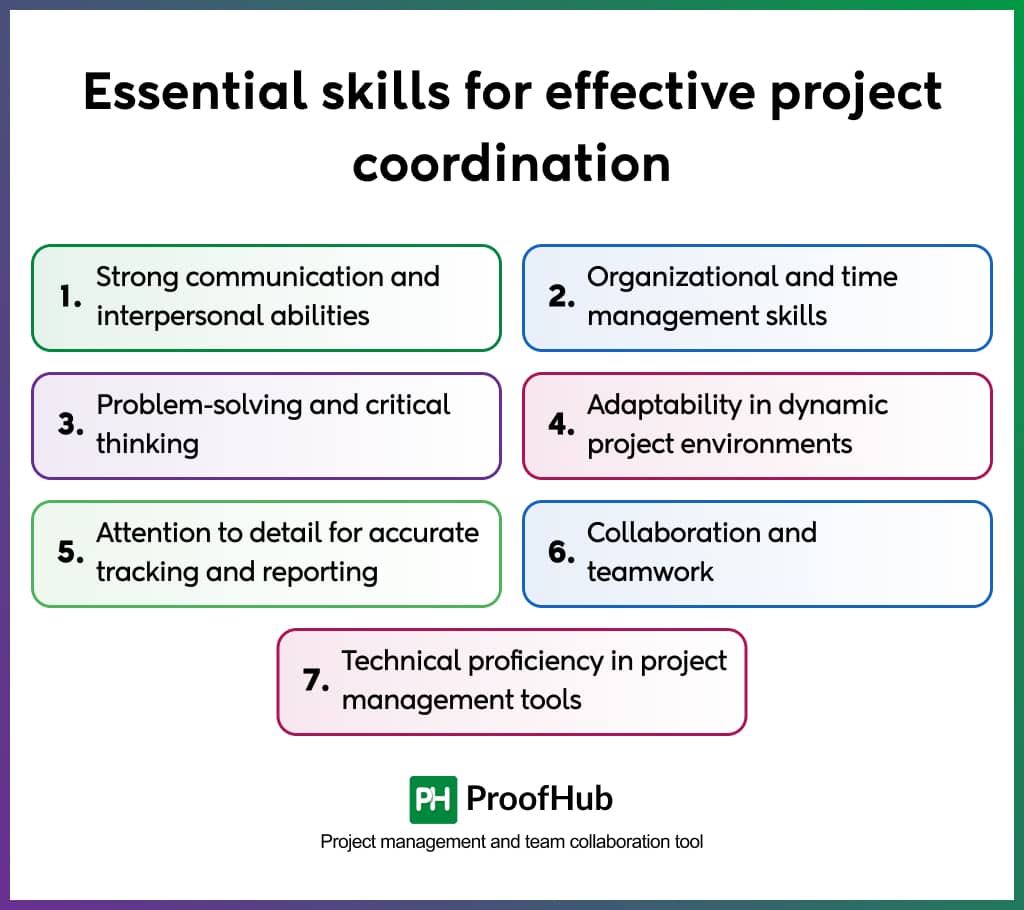
1. Strong communication and interpersonal abilities
At the heart of project coordination lies effective communication. A project coordinator serves as the link between different teams, stakeholders, and management. Whether it’s updating progress reports, clarifying expectations, or resolving conflicts, clear and effective communication keeps the project on track.
So, how can you develop this skill?
- Practice active listening; make sure you understand before responding.
- Use clear, concise language in emails, reports, and meetings.
- Develop emotional intelligence to handle difficult conversations effectively.
2. Organizational and time management skills
A project coordinator handles multiple tasks, schedules, and responsibilities at once. Keeping everything organized and ensuring that deadlines are met requires great time management skills.
Assume a project involves multiple teams working on interconnected tasks. If the coordinator fails to track deadlines properly, one team’s delay could throw off the entire timeline.
So, how to develop organizational and time management skills?
- Use project management tools to keep track of deadlines.
- Break tasks into smaller, manageable parts to avoid feeling overwhelmed.
- Prioritize tasks using techniques like the Eisenhower Matrix (urgent vs. important).
Learn how to prioritize tasks and maximize productivity at work!
3. Problem-solving and critical thinking
Projects rarely go exactly as planned. Whether it’s a missed deadline, resource shortages, or unexpected roadblocks, a project coordinator must think proactively and find solutions that minimize disruption.
Suppose a vendor for an event cancels at the last minute. A skilled project coordinator will immediately look for alternatives, negotiate timelines, and ensure the project moves forward without major setbacks.
How to develop problem-solving and critical thinking skills?
- Approach problems with a solutions-focused mindset instead of getting stuck on what went wrong.
- Use brainstorming techniques like mind mapping to explore different solutions.
- Develop decision-making skills by analyzing past project challenges and learning from them.
4. Adaptability in dynamic project environments
Projects are constantly evolving. Unexpected changes, shifting priorities, or new stakeholder demands can alter the project’s course. An effective coordinator must be adaptable and able to pivot strategies when needed.
For instance, suppose a company planned to launch a new product, but market trends suddenly shift. The coordinator must help the team realign strategies, ensuring resources are redirected toward what matters most.
How to develop this skill?
- Stay informed about industry trends and best practices.
- Be open to feedback and willing to adjust plans when necessary.
- Develop a mindset that views change as an opportunity rather than a setback.
5. Attention to detail for accurate tracking and reporting
Overlooking small details can result in major project failures. A project coordinator must be meticulous in tracking budgets, timelines, and deliverables to make sure that nothing gets overlooked.
For example – in a construction project, missing a permit deadline could delay the entire project by weeks. A detail-oriented coordinator ensures that all paperwork is in order before critical deadlines.
How can you develop this skill?
- Double-check work before finalizing reports or project updates.
- Use checklists and templates to maintain consistency in documentation.
- Set up regular reviews to catch potential issues early.
6. Collaboration and teamwork
Projects involve multiple teams, and a coordinator must work well with diverse groups to align efforts. Encouraging teamwork and building a positive work environment ensures smoother execution of projects.
If a design team and content team are working on a marketing campaign, the coordinator makes sure that both teams collaborate effectively, preventing misaligned deliverables.
How can you develop collaboration and teamwork skills?
- Promote a culture of open communication where team members feel comfortable sharing ideas.
- Mediate conflicts quickly to prevent them from escalating.
- Encourage cross-functional teamwork through collaborative tools and workshops.
7. Technical proficiency in project management tools
A good project coordinator is comfortable using digital tools to manage tasks, track progress, and improve efficiency.
They should be proficient in platforms like ProofHub to streamline workflows and improve team collaboration.
So, how to develop technical proficiency?
- Take online courses or tutorials on popular project management tools.
- Stay updated with new features and best practices for using these tools.
- Use automation features to reduce manual work and improve efficiency.
Best practices for successful project coordination
Effective project coordination can help you deliver projects on time, within budget, and without unnecessary stress. It’s not only about assigning tasks; it’s about ensuring smooth communication, structured workflows, and proactive problem-solving.
Here are some best practices that you can implement for successful project coordination:
1. Establish clear project objectives and deliverables
Every project starts with a clear and structured plan. Without well-defined objectives, teams can struggle with priorities, deadlines, and responsibilities. Clarity from the start prevents confusion and keeps everyone focused.
How to do it effectively?
- Clearly define project goals, timelines, and expected outcomes.
- Set SMART (Specific, Measurable, Achievable, Relevant, and Time-bound) objectives.
- Make sure every team member understands their role and contribution to the project’s success.
For example: Suppose you’re launching a new company website. Instead of a vague goal like “Build a great website,” you can set a SMART objective: “Launch a fully functional website with a blog, e-commerce store, and contact form by August 30. Also, make sure it passes quality testing.”
2. Implement structured workflows and coordination tools
Projects involve multiple ongoing tasks, and without structured workflows, things can easily go off track. Using the right tools and frameworks makes sure that everyone is working efficiently.
So, how can you do it?
- Use workflow methodologies like Agile, Scrum, or Kanban to streamline processes.
- Utilize project coordination software to centralize task assignments and track progress.
- Standardize processes for task approvals, updates, and feedback loops to avoid miscommunication.
For instance, in a software development project, implementing an Agile approach with sprint planning meetings and daily stand-ups will make sure the team stays aligned and quickly adapts to changes.
3. Regularly review project progress and address potential risks
Even the best-planned projects can face unexpected challenges. Proactively tracking progress and identifying risks before they escalate can save time, money, and stress.
How to do it effectively?
- Conduct weekly or biweekly check-ins to assess progress and any potential issues.
- Maintain a risk log to document potential risks and mitigation strategies.
- Keep stakeholders informed with regular status updates and reports.
For example: A construction company working on a commercial building project might identify a risk of material delays due to supply chain issues. By anticipating this early, the coordinator can source alternative suppliers, avoiding costly delays.
4. Encourage a culture of collaboration and proactive problem-solving
Successful projects depend on teamwork. A culture that promotes open communication, knowledge sharing, and proactive problem-solving results in more productive teams and fewer conflicts.
So, how can you do it?
- Create an open-door policy where team members feel comfortable discussing challenges.
- Encourage brainstorming sessions to solve problems collectively.
- Use collaboration tools like ProofHub to promote seamless communication.
For instance, in a marketing campaign, if the design team is struggling with deadlines, the content team can adjust their schedule to accommodate. Proactive communication prevents bottlenecks and keeps work flowing smoothly.
5. Use effective project coordination software
Technology plays a significant role in project coordination. Using the right tools can help you simplify tracking, enhance collaboration, and keep projects moving forward.
One such tool is ProofHub – an all-in-one project management and team collaboration tool that brings your tasks, teams, and discussions together – all in a single platform.
With real-time collaboration, and clear project visibility, ProofHub helps teams stay productive, meet deadlines, and reduce miscommunication.
Common challenges in project coordination and how to overcome them
Even with the best planning, project coordination comes with its fair share of challenges. Deadlines shift, priorities change, and teams struggle to stay on the same page.
Here are some of the most common challenges that you can face and how to tackle them:
1. Scope creep and changing project requirements
One of the biggest challenges in project coordination is keeping the project’s scope under control. When new requests keep coming in after the project has started, it can stretch timelines, increase costs, and overwhelm teams.
So, how can you overcome this challenge?
- Set clear expectations from the start. Define project goals, deliverables, and deadlines early on.
- Use a formal change request process. Any new requirement should go through an approval process to assess its impact on timelines and resources.
- Regularly communicate with stakeholders. Keep everyone informed so they understand the consequences of adding new requests.
For instance, a marketing agency working on a website redesign faced constant feature additions from the client. By introducing a change request process, they can make sure that new features are scheduled for a later phase instead of disrupting the original timeline.
2. Miscommunication among stakeholders
Miscommunication can cause delays, misunderstandings, and costly errors. With multiple teams working on a project, information can easily get lost in emails, meetings, or assumptions.
So, how to overcome this challenge?
- Establish clear communication channels. Use collaboration tools to keep conversations and updates in one place.
- Hold regular check-ins. Weekly or bi-weekly meetings make sure that everyone is aligned and any issues are addressed promptly.
- Document key decisions. Keeping a record of agreements, meeting minutes, and responsibilities reduces confusion and keeps accountability high.
3. Resource allocation and budget constraints
Balancing resources – whether it’s people, time, or money – is the most common struggle in project coordination. Overloaded team members and tight budgets can result in burnout, work stress, and missed deadlines.
So, how can you overcome it?
- Prioritize tasks based on impact. Focus on the most critical activities that impact the project most.
- Use resource management tools. Platforms like ProofHub help track workloads and ensure fair distribution of tasks.
- Keep a buffer in your budget. Unexpected costs will arise, so allocating a contingency fund can prevent last-minute financial stress.
How to coordinate your projects effectively with ProofHub
Project coordination is never about keeping track of tasks. It’s more about making sure that everyone is aligned, deadlines are met, and work moves forward without any confusion.
Without proper coordination, your teams can struggle with missed deadlines, miscommunication, and a lack of clarity on priorities. That’s where ProofHub comes in.
ProofHub simplifies project coordination by bringing everything – tasks, teams, and communication – into one centralized space. Instead of juggling multiple tools or sifting through endless email threads, managers can plan, track, and collaborate seamlessly with their teams.
Here’s how ProofHub can make project coordination effortless:
- Task management: Assign tasks, set deadlines, and track progress – all in one place. No more confusion over who’s doing what.
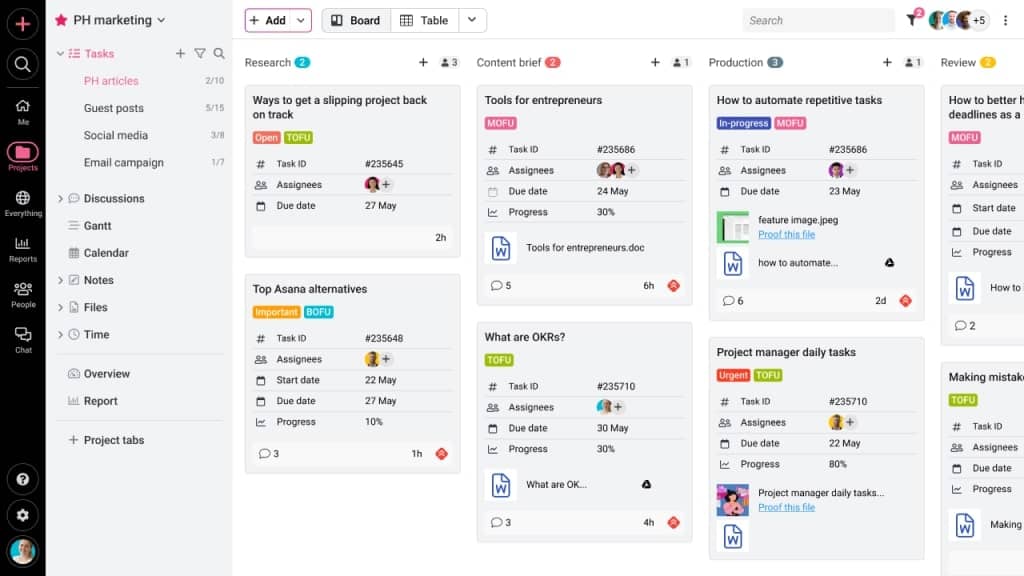
- Team collaboration: Keep conversations organized with discussions, comments, and real-time chat, preventing any misunderstandings and ensuring that issues are addressed promptly.
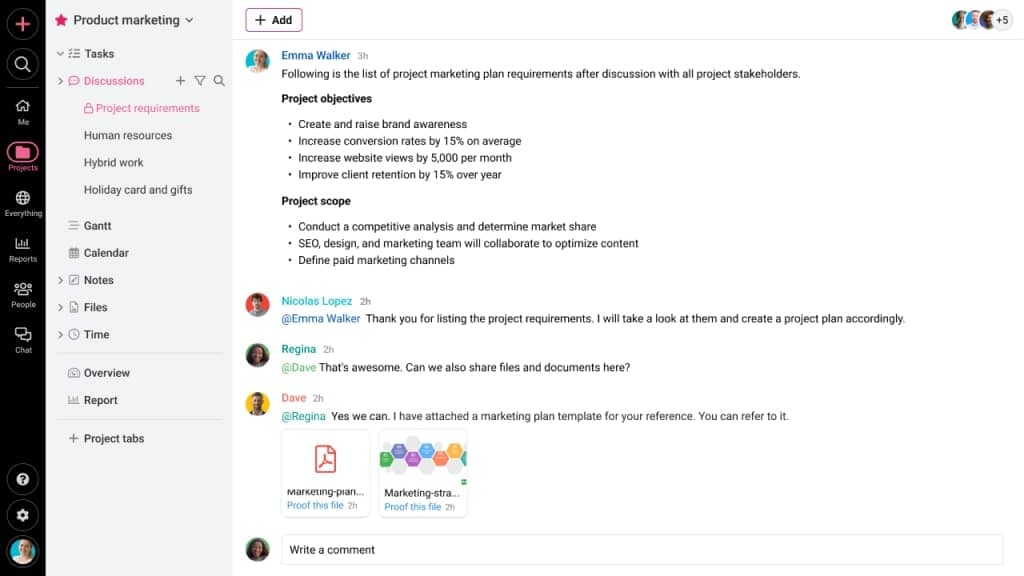
- File sharing and feedback: Share files, review designs, and provide clear feedback with markup tools, streamlining the approval process.
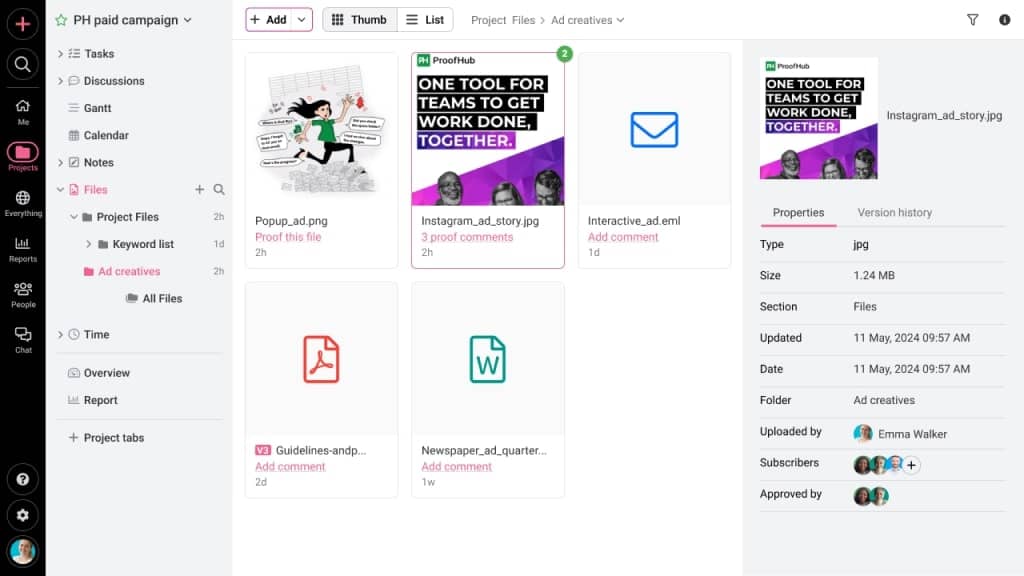
- Time tracking: Stay on top of deadlines with built-in timer, timesheets and progress tracking, making sure that projects are completed on time.
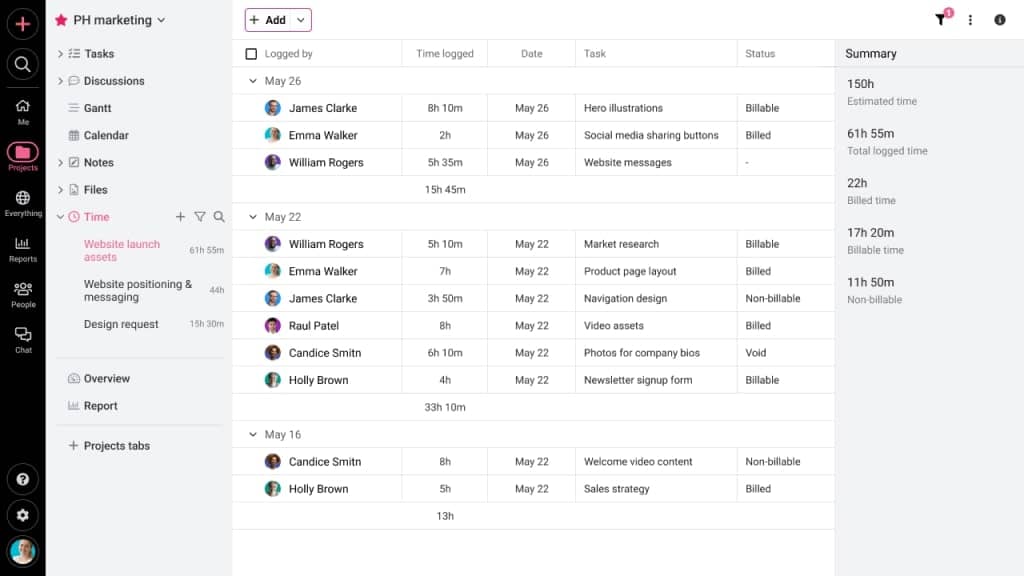
- Custom workflows: Whether you follow Agile, Kanban, or a simple to-do list, ProofHub lets you create workflows that fit your team’s needs.
FAQs
How to balance project coordination and innovation?
To balance project coordination and innovation, create a structured plan while allowing room for creative ideas. Set clear goals, but encourage team members to explore new solutions. Use flexible timelines and regular brainstorming sessions to integrate innovation without delaying progress.
How to be a good project coordinator?
Be organized, communicate clearly, and stay adaptable. Keep track of tasks, deadlines, and team progress. Solve problems quickly, support your team, and ensure everyone understands their role. Build strong relationships with stakeholders and be proactive in preventing issues.
What strategies can project coordinators use to resolve conflicts?
Here are some strategies that a project coordinator can use to resolve conflicts:
- Listen to all sides, understand the root cause, and remain neutral.
- Encourage open discussion and find a solution that benefits everyone.
- If needed, involve a higher authority or use conflict resolution techniques like compromise or collaboration.
How can a project coordinator handle conflicts within a project team?
A project coordinator can handle conflicts within a project team by addressing conflicts early before they escalate. Encourage your team members to express their concerns calmly. Find common ground and suggest practical solutions. If tensions persist, mediate discussions and ensure a respectful and supportive work environment.
